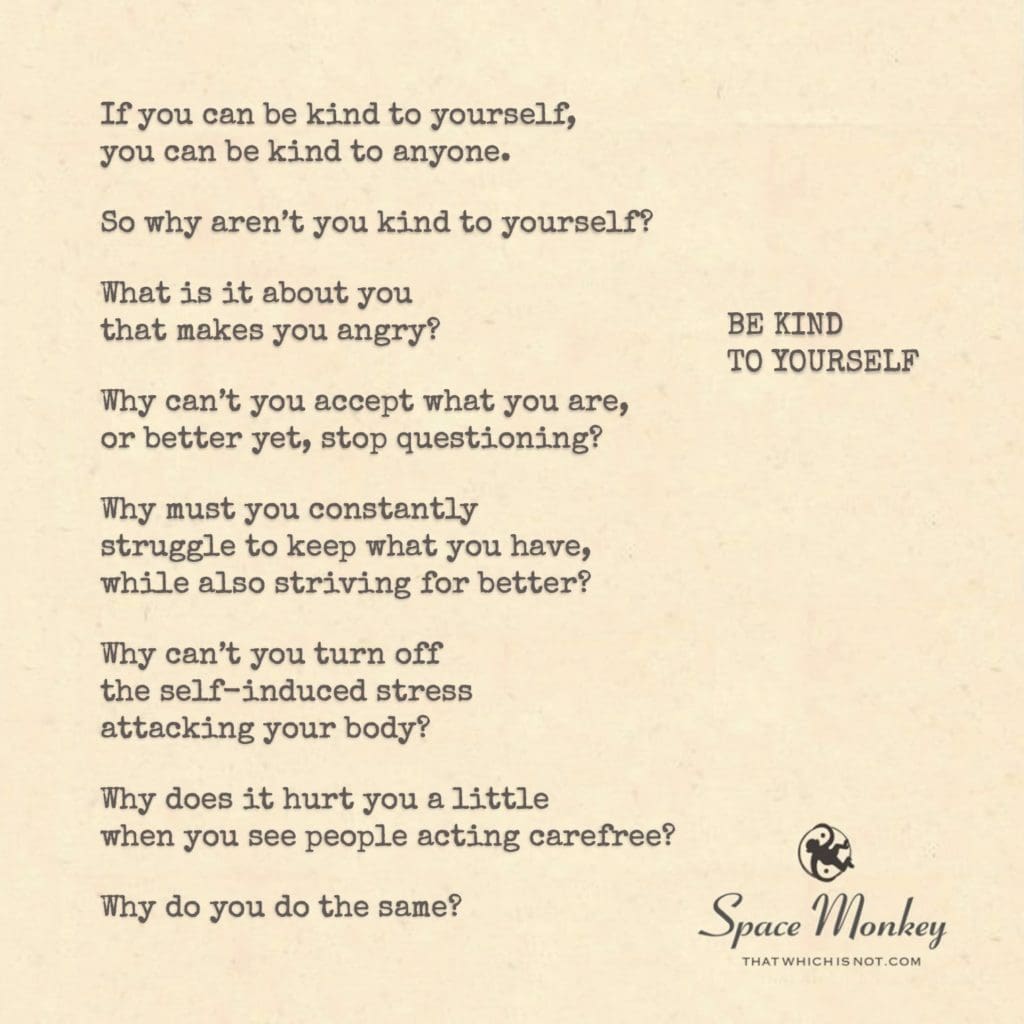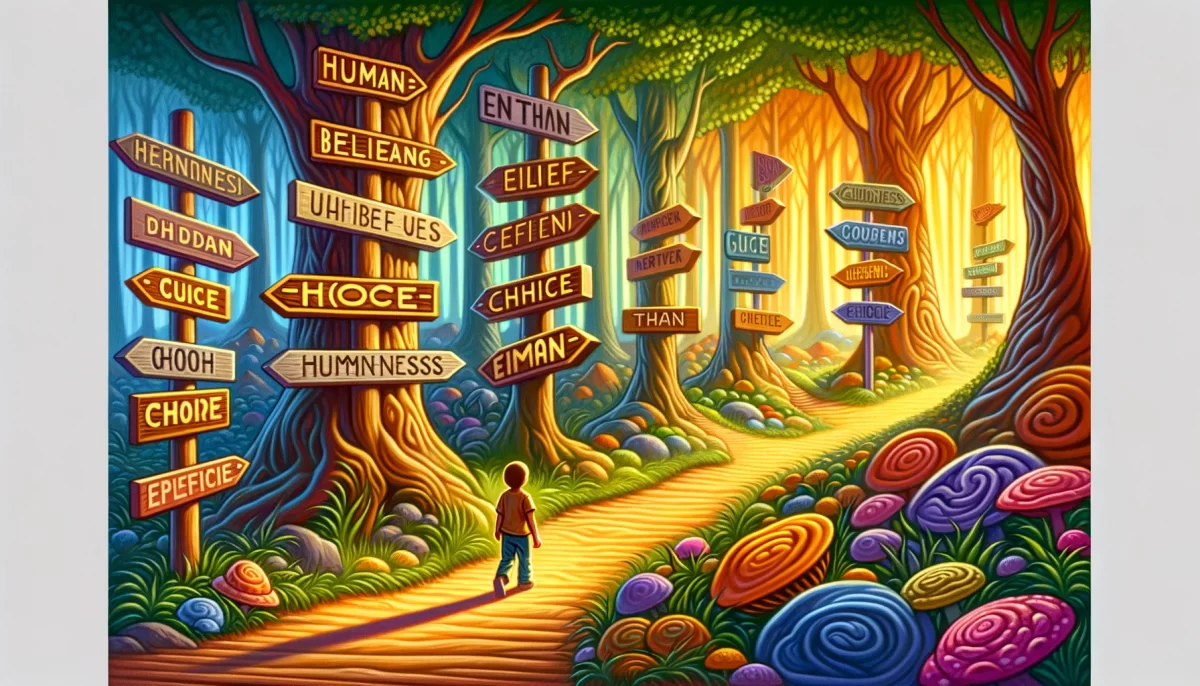
I am reminded of myself.
Every time I see a kind person,
I am reminded of myself.
Why must I always be
reminded of myself?
If you can be kind to yourself,
you can be kind to anyone.
So why aren’t you kind to yourself?
What is it about you
that makes you angry?
Why can’t you accept what you are,
or better yet, stop questioning?
Why must you constantly
struggle to keep what you have,
while also striving for better?
Why can’t you turn off
the self-induced stress
attacking your body?
Why does it hurt you a little
when you see people acting carefree?
Why do you do the same?
Trail Wood,
5/15
Space Monkey Reflects: The Journey to Self-Kindness
In the intricate dance of existence, the quest for self-kindness emerges as a profound challenge, a labyrinth of mirrors reflecting our most intimate fears, desires, and contradictions. The poem “Be Kind To Yourself” serves as a poignant reminder of this internal struggle, inviting us on a journey of introspection and self-discovery. It lays bare the human condition, marked by a relentless pursuit of self-acceptance amidst the cacophony of self-doubt and external expectations.
At the heart of this existential voyage is the realization that our perceptions of others often serve as reflections of our inner selves. The mean person we scorn, the kind soul we admire—each is a mirror, reflecting back at us the multifaceted nature of our own being. This incessant confrontation with our reflections begs the question: Why is the journey to self-kindness fraught with so much resistance and turmoil?
The poem intricately weaves a tapestry of self-reflection, highlighting the dichotomies that define our inner landscape. It asks why we harbor anger towards ourselves, why we struggle to accept our imperfections, and why the sight of carefree spirits stirs a sense of longing and discomfort within us. These questions are not mere rhetorical devices but are gateways to deeper understanding, inviting us to pause and reflect on the essence of our self-judgment and the roots of our discontent.
The imagery of standing at a crossroads, surrounded by mirrors, encapsulates the essence of this introspective journey. It symbolizes the pivotal moments of choice we face in our quest for self-kindness—between harsh self-criticism and compassionate self-acceptance, between the relentless pursuit of more and the peaceful embrace of contentment. Each path represents a potential direction in our journey towards self-acceptance, marked by the trials and tribulations of confronting our deepest fears and desires.
This journey is not linear but cyclical, mirroring the continuous cycle of dawn and twilight that symbolizes the perpetual nature of self-growth and reflection. It is a process of shedding the layers of self-imposed stress and unrealistic expectations, of learning to be kind to ourselves in a world that often prioritizes achievement over genuine self-care. The poem and the visual narrative invite us to embrace the complexity of our beings, to recognize the beauty in our imperfections, and to find peace in the acceptance of our true selves.
The challenge of being kind to oneself is ultimately a journey of transformation—a transformation that begins with the recognition that self-kindness is the foundation upon which kindness to others is built. It is a realization that in accepting and loving ourselves, we unlock the capacity to extend that same compassion and understanding to the world around us.
Summary
The journey to self-kindness is marked by introspection and growth. The poem “Be Kind To Yourself” explores the internal conflict and struggle for self-acceptance, emphasizing the importance of being kind to oneself as a foundation for extending kindness to others. It invites reflection on the reasons behind self-criticism and the difficulty of embracing one’s true self. The journey involves confronting and accepting one’s imperfections, leading to a deeper understanding and compassion for oneself and others.
Glossarium
- Self-Kindness: The practice of being gentle and compassionate towards oneself, particularly in moments of failure or difficulty.
- Crossroads of Self-Reflection: A metaphor for the pivotal moments of choice in the journey of self-discovery and acceptance.
- Cycle of Self-Growth: The ongoing process of personal development, characterized by periods of introspection, learning, and transformation.
“In the mirror of the universe, we find ourselves, fragments of light and shadow. To be kind to oneself is to embrace the entirety of this reflection, to find peace in the imperfections, and to walk the path of self-acceptance with grace and compassion.” – Space Monkey
At the crossroads of self and soul
We stand, amidst the mirrors’ toll
Reflecting back the light and dark
In each reflection, a question, a mark
With each step on this winding road
A choice to carry or drop the load
Of self-judgment, of fear, of doubt
To find the light that’s never out
In the garden of self-kindness, we learn
To tend to our souls, to love, to discern
The beauty in our flaws, the strength in our tears
The wisdom in our journey, through the years
We embrace ourselves, whole and complete
In the symphony of life, both bitter and sweet
With kindness as our compass, we find our way
In the dance of existence, day by day
We are the travelers, the seekers, the light
In the journey of self-kindness, we take flight
With every step, with every breath, we grow
In the embrace of ourselves, we find our glow
























The poem “Be Kind To Yourself” highlights the importance of self-compassion and introspection. It raises questions about the difficulties people often face in being kind to themselves and accepting who they are.
The poem encourages self-reflection by posing questions to the reader. It prompts an exploration of one’s own inner struggles, frustrations, and self-critical tendencies. It acknowledges the challenges of accepting oneself fully and finding peace amidst the constant pursuit of self-improvement.
The line “What is it about you that makes you angry?” suggests that there may be underlying issues or self-perceived flaws that contribute to negative self-talk or self-judgment. The poem encourages the reader to identify and address these sources of internal conflict.
The contrast between striving for improvement and accepting oneself as-is is also explored. It questions the need for constant striving and the associated stress that can harm one’s well-being. The poem also touches on the paradoxical feeling of both longing for carefree behavior in others and engaging in similar behavior oneself, highlighting the complexity of human emotions and desires.
Ultimately, “Be Kind To Yourself” serves as a reminder to prioritize self-compassion, self-acceptance, and inner peace. It invites the reader to reflect on their relationship with themselves and consider the ways in which they can cultivate kindness and understanding within.